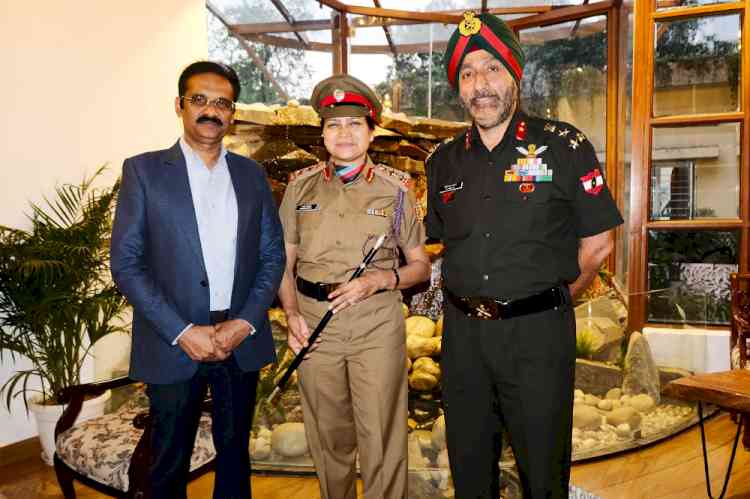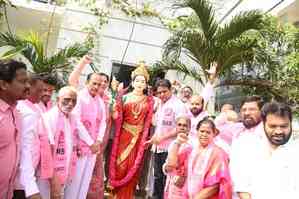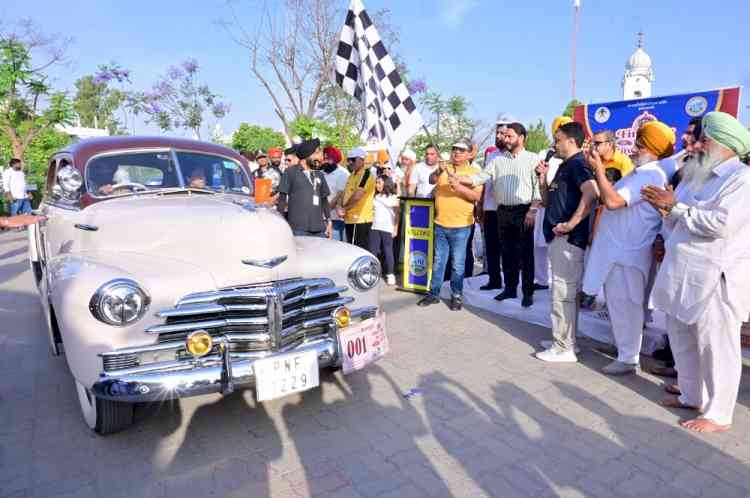PPBM President Amrit Lal Jain writes to Union FM on GST
Author(s): City Air NewsLudhiana, October 23, 2015: Amrit Lal Jain, State President, Punjab Pradesh Beopar Mandal (PPBM) has written to Arun Jaitly, Union Finance Minister, regarding GST, according to the mandal’s state secretary Mohinder...

Ludhiana, October 23, 2015: Amrit Lal Jain, State President, Punjab Pradesh Beopar Mandal (PPBM) has written to Arun Jaitly, Union Finance Minister, regarding GST, according to the mandal’s state secretary Mohinder Aggarwal.
The letter written by Jain reads as under:
“Punjab Pradesh Beopar Mandal puts its point of view on GST and seeks Clarifications on certain points regarding GST bill pending in the Rajya Sabha.
In the Budget speech of 2005-06 Mr. P Chidambaram then Finance Minister, Govt. of India set the goal of goods and services Tax(GST).
The fundamental objective of GST is to redeem the promise of article 301 in part XIII of the constitution of India: “Subject to the other provisions of this part, trade, commerce and interstate throughout the territory of India shall be free”.
The BJP(NDA) Govt. introduced the constitution(122nd amendment ) Bill in December 2014.
The trading community of the country is surprised that GST Bill which is passed by Lok Sabha and pending in the Rajya Sabha effects 5 crores traders and industrialists of the country knew nothing except what they are reading in the newspapers. In the beginning it was said that the GST will be uniform and there will be only one tax under GST regime and its collection will be distributed amongst the states. We welcome this type of GST but the truth is just the opposite. The main benefits of GST regime promises is a reduction of multiple taxes which is a good step, if GST is only on the pattern of other countries.
1. Article 246 A now confers power on parliament and every state legislature to levy goods and service tax. Thus, we are likely to have one parliamentary law and about 28 state laws that will levy GST and there is no constitutional requirements that all the state laws be uniform. It will prove to be a like Vat Act 2005.
2. How we are going to merge existing laws on Excise duty, Vat, Service Tax together. It is indeed unfortunate that the enactments and rules on the GST are still unknown. This is a dangerous area of darkness.
3. There is still uncertainty about the final GST rate or rates. We doubt even a multiple GST levy of even 16/18 % is bound to result in large scale tax evasion at the retail level.
4. While most countries(about 132) have a single GST only a few have a dual GST. The Indian version is likely to be most complex with different states enacting their own laws. It may prove to be unsuited to a vast, heterogeneous country like India. Indeed, the needs of states like Maharashtra and Gujarat are completely different from states like Punjab, Haryana, H.P, Jharkhand etc.
5. The GST is a merger of central and state levies administered by central and state government officials. How many assesses will we have state-wise? Who will administer a combined GST? Will each state insist on administering the GST within its territory? If so, there will be no role of the central excise or service tax departments, except in inter-state transactions. Which are the appellate authorities? Will there be one tribunal or multiple tribunals?
6. There will be three types of GST registration as per requirements of the dealers. Central GST (CGST), State GST(SGST) and Integrated GST(IGST). Tax payers will be require to make payments of CGST,SGST,IGST. Integrated GST is against the basic spirit of GST and perhaps this type of GST is nowhere in the world.
7. Exporters currently have the option to avail of duty free inputs but under the GST regime, this option may not be available. “This may lead to serious blockage of funds for exporters”. To get the refunds are likely to face same fate and music as happening in Vat refunds.
8. What are the taxes that will be continued alongside GST and excluded goods(vat free) and services? Why petroleum products, Tobacco and electricity are being excluded from GST.
9. Have the states agreed to dismantle all check posts, ICC and entry barriers before GST regime is enforced.
10. Is the IT back bone to support the administration of GST fully ready in place?
11. Under Integrated GST will present C-Forms will continue?
12. Will transfer of goods will be allowed under GST without charging integrated GST?
13. Is there will be a constitutional guarantee that under GST regime no State Government will to impose any type of tax like entertainment tax, entry tax, Purchase tax, Luxury tax etc.
14. We still feel what is the compulsion with the central government to publish complete GST law, its rules and regulation, rates etc.,who will be the collecting agencies and how many departments will access three types of GST be made clear before passing this bill in the Rajya Sabha, otherwise there will be a large scale hue and cry amongst the traders and industrialists of the Country.
15. Under GST regime there should not be any immunity to officials who will deal with the GST regime, they should be accountable as under vat act officials are not accountable.
16. Whether GST shall be applicable to the state of J&K?
17. A number of states to attract investment from within and outside country to setup industrial houses have offered a number of incentives including Vat exemption up to 80% from 5 to 10 years. After the implementation of GST what is the fate of these incentive?
18. Business community is not informed even on the draft business process on GST registration, GST refunds and GST payments. As reported in the press draft report on refunds and payment, tax payers would be provided for monthly filing of returns for business to business dealing through a set of 8 forms for different categories of transactions and different dates are also fixed. It will be a quite lengthy and complicated process.”

 cityairnews
cityairnews 
















